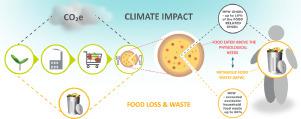Resources, Conservation and Recycling ( IF 11.2 ) Pub Date : 2021-07-11 , DOI: 10.1016/j.resconrec.2021.105777 Niina Sundin , Magdalena Rosell , Mattias Eriksson , Carl Jensen , Marta Bianchi

|
The environmental impacts of food systems and the health consequences of excess food intake are well-acknowledged global issues. However, the climate impact of excess food intake, or metabolic food waste, has received less attention. This study estimated the amount of metabolic food waste and its climate impact in Sweden. Excess food intake was estimated based on the adult overweight and obesity prevalence in Sweden, by applying two alternative calculation methods, one based on the energy content of excess body fat, and the other based on the excess energy intake due to excess body fat. These caloric values were translated to food consumption patterns according to three dietary scenarios and their climate impact estimated based on carbon footprint data. The results showed that the annual amount of metabolic food waste represented 480–710 kt of food in Sweden and, regardless of dietary scenario, exceeded the annual amount of avoidable household food waste. The estimated greenhouse gas emissions from the metabolic food waste amounted up to 1.2 Mt CO2e annually, accounting for approximately 2% of the total and 10% of the food-related climate impact in Sweden. This study confirms the magnitude of the hidden climate cost of excess food intake on a national level and emphasizes the importance of taking this aspect into consideration in actions to improve both planetary and human health. Although applied to the Swedish context, the methodology used in the present study could also be used to assess the environmental impact of excess food intake in other countries globally.
中文翻译:

过量食物摄入对气候的影响——可避免的环境负担
食物系统对环境的影响以及过量食物摄入对健康的影响是众所周知的全球性问题。然而,过量食物摄入或代谢食物浪费对气候的影响较少受到关注。这项研究估计了瑞典代谢食物垃圾的数量及其对气候的影响。根据瑞典成人超重和肥胖的患病率,通过应用两种替代计算方法估计过量食物摄入量,一种基于体内多余脂肪的能量含量,另一种基于体内多余脂肪导致的过量能量摄入。根据三种饮食情景及其基于碳足迹数据估计的气候影响,将这些热量值转化为食物消费模式。结果表明,瑞典每年产生的代谢食物垃圾量为 480-710 千吨食物,无论饮食情况如何,都超过了每年可避免的家庭食物垃圾量。来自代谢食物垃圾的估计温室气体排放量高达 1.2 Mt CO2 e 每年,约占瑞典总和食品相关气候影响的 2% 和 10%。这项研究证实了国家层面过量食物摄入的隐性气候成本的重要性,并强调了在改善地球和人类健康的行动中考虑这一方面的重要性。尽管适用于瑞典的情况,但本研究中使用的方法也可用于评估全球其他国家过量食物摄入对环境的影响。









































 京公网安备 11010802027423号
京公网安备 11010802027423号